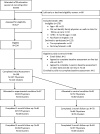Promoting early treatment for mild traumatic brain injury in primary care with a guideline implementation tool: a pilot cluster randomised trial
- PMID: 33082178
- PMCID: PMC7577038
- DOI: 10.1136/bmjopen-2019-035527
Promoting early treatment for mild traumatic brain injury in primary care with a guideline implementation tool: a pilot cluster randomised trial
Abstract
Objectives: New clinical practice guidelines for the management of mild traumatic brain injury (mTBI) emphasise that family physicians should proactively screen and initiate treatment for depression/anxiety, insomnia and headaches. This study aimed to evaluate the feasibility of delivering an implementation intervention to family physicians.
Design: Pilot cluster randomised controlled trial.
Setting: Specialty outpatient clinic (recruitment) and primary care (implementation).
Participants: 114 primary care clinics were randomised. These clinics were associated with 137 unique family physicians caring for 148 adult patients who sustained an mTBI within the previous 3 months and were seeking care for persistent symptoms.
Interventions: Patients completed self-report screening measures for depression/anxiety, insomnia and headaches. A tailored letter that incorporates the patient's screening test results and associated treatment algorithms was sent to their family physician (or walk-in clinic). Physicians at clinics assigned to the control condition received a generic letter, without the screening test results.
Primary outcome measures: Feasibility outcomes included the frequency of primary care follow-up, retention rates and reliability of patient recall of their physicians' actions (primary mechanistic outcome). The primary efficacy outcome was the Rivermead Post-Concussion Symptom Questionnaire (RPQ).
Results: Most patients (97.8%; 128 of 131) followed up at the primary care clinic they planned to. Retention rates were 88% (131 of 148) and 78% (116 of 148) at the 1-month and 3-month assessments, respectively. Agreement between patient recall of their physicians' actions and medical chart audits was moderate (intraclass correlation coefficient=0.48-0.65). Patients in the experimental group reported fewer symptoms on the RPQ compared with those in the control group, whose physician received a general letter (B=-4.0, 95% CI: -7.3 to -0.7).
Conclusions: A larger trial will need to address minor feasibility challenges to evaluate the effectiveness of this guideline implementation tool for improving mTBI clinical outcomes and confirm the mechanism(s) of intervention benefit.
Trial registration number: NCT03221218.
Keywords: clinical trials; depression & mood disorders; neurological injury; primary care.
© Author(s) (or their employer(s)) 2020. Re-use permitted under CC BY-NC. No commercial re-use. See rights and permissions. Published by BMJ.
Conflict of interest statement
Competing interests: None declared.
Figures
References
-
- Cassidy JD, Cancelliere C, Carroll LJ, et al. . Systematic review of self-reported prognosis in adults after mild traumatic brain injury: results of the International collaboration on mild traumatic brain injury prognosis. Arch Phys Med Rehabil 2014;95:S132–51. 10.1016/j.apmr.2013.08.299 - DOI - PubMed
Publication types
MeSH terms
Associated data
LinkOut - more resources
Full Text Sources
Medical


